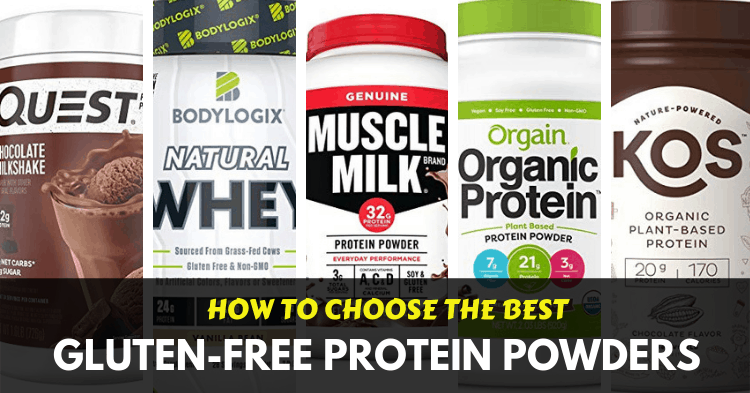
A gluten-free protein powder is a great way to ensure you still meet your sailing protein goals, even if you have specific dietary requirements. Free of any contentious ingredients, the best gluten-free protein powder supplements gives you a quick and effortless way of increasing your daily protein intake. The body requires a certain amount of protein per day to help repair cells and keep the body functioning normally. Doctors recommend an intake of 0.75g per kg of body weight. However, when weight training, this amount increases as you are placing your muscles under greater stress and need the extra protein to rebuild them. Supplementing with a gluten-free protein powder is a great way to introduce extra protein into your diet without too many excess calories or unhealthy nutrients.
A gluten-free protein powder is a great choice of supplement as they are perfect for any occasion. Whether you are on the go and lack the time to prepare a meal or simply looking for something to top you up between meals after a big weight session, they provide everything you need in a single drink. Gluten-free protein powder is also great to combine in other dishes, such as your morning oatmeal or healthy gym and diet-friendly cookies.
When training in the gym, a good quality gluten-free protein powder is likely one of the first supplements to introduce to your diet. Protein helps you recover faster from your workouts and see visible results from your training. However, there are literally hundreds of options to choose from, which can make finding the perfect supplement a daunting task. To help you narrow down your options, we’ve compiled a list of the top gluten-free protein powder supplements for you to consider adding to your training diet.
Contents
- 10 Best Gluten-Free Protein Powder Choices
- 1. TGS All Natural Unsweetened Whey Protein Powder
- 2. Bodylogix Natural Grass-Fed Whey Protein Powder
- 3. Body Fortress Super Advanced Whey Protein Powder
- 4. Dymatize ISO 100 Whey Protein Powder
- 5. MusclePharm Combat Protein Powder
- 6. KOS Organic Plant-Based Protein Powder
- 7. Quest Nutrition Chocolate Milkshake Protein Powder
- 8. Muscle Milk Genuine Protein Powder
- 9. Isopure Zero Carb Protein Powder
- 10. Orgain Organic Plant-Based Protein Powder
- Why should you use a gluten-free protein powder?
- How do I choose the best gluten-free protein powder?
- Takeaway
10 Best Gluten-Free Protein Powder Choices
Choosing the best gluten-free protein powder is as much about finding one that works right for your body as it is the varying vitamins and proteins they provide.
Below are the ten best gluten-free protein powder options that provide something for everybody, regardless of body type and training goals.
1. TGS All Natural Unsweetened Whey Protein Powder
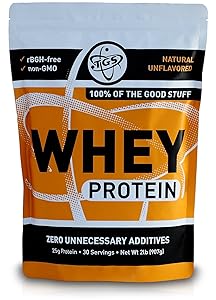
If you’re after an unflavored but quality whey protein powder, this all-natural concentrate from TGS Nutrition comes highly-recommended.
The benefit of being unsweetened is that you can use it in a variety of recipes, and not have to worry about the flavor being altered. From low-calorie chocolate to extracts and natural juices, this protein powder gives you complete control and flexibility.
Another noteworthy attribute of this protein powder is that it contains only two natural compounds. With just whey protein concentrate and sunflower lecithin as the ingredients, you’re guaranteed that your body is getting the exact nutrients it needs and nothing more.
- It’s unflavored, meaning you can add your preferred flavor
- Delivers at least 25 grams of protein per serving
- Free of GMO, soy, gluten and rBGH growth hormone
- Made up of only 2 ingredients
- None
2. Bodylogix Natural Grass-Fed Whey Protein Powder

Formulated by a reputable company that has a 10-year experience in the industry, Bodylogix Natural Protein Powder is another one of the best gluten-free protein powders.
This product’s first ingredient is whey protein concentrate, followed by the isolate and hydrolysate.
The fact that it’s a whey blend explains why it has a high fat and carb content. By high we mean 2.5 grams of fat with 0.5 grams being saturated fat, as well as 3 grams of carbohydrate.
What we like most about Bodylogix is that it’s rich in protein; provides a whopping 24 grams per serving. Also, the whey used in this formula is obtained from grass-fed cows.
Another point to note is that the powder does not contain any artificial flavors, colors or sweeteners. Lastly, it comes in several flavors that include vanilla bean, decadent chocolate, and caramel chocolate.
- Being an all-natural product; 24 grams of protein is a decent offering
- It’s easy to mix; this is one aspect that I prioritize because I like having my shakes on the go
- Great-tasting
- Zero artificial ingredients
- A little too sweet for some consumers
- It’s not reinforced with any vitamins or minerals
3. Body Fortress Super Advanced Whey Protein Powder
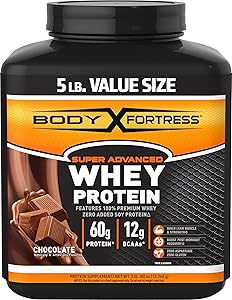
Tailored for weightlifters and bodybuilders, the Super Advanced Whey Powder is chock full of protein and other nutrients. With 60 grams of protein per 2-scoop serving, you can’t go wrong with this supplement.
It also provides 6 grams of carbohydrate and 3.5 grams of fat with 1.5 grams consisting of saturated fat. But what really sets this protein powder apart is the incorporation of micronutrients such as calcium, phosphorus, magnesium, sodium and potassium.
What’s more, it’s been reinforced with creatine, taurine, and L-Glutamine, which aid in the maintenance of muscle tissues.
To meet your daily protein requirements, add one scoop to 6-8 ounces of your favorite beverage. Ensure you take this within 10 minutes of mixing.
- Contains a high amount of proteins
- Full of micronutrients that are necessary for normal growth and development
- Contains additional muscle-building ingredients such as creatine, taurine and L-Glutamine
- A high cholesterol content
- Contains artificial sweeteners
4. Dymatize ISO 100 Whey Protein Powder

If protein powders always leave you with tummy aches, the lactose-free Dymatize ISO 100 is an excellent substitute.
In fact, this is one of the few gluten-free protein powders that’s made of hydrolyzed isolate. Even though it contains a tiny amount of whey isolate, hydrolyzed whey makes up the larger portion meaning that it digests quickly and easily.
Dymatize ISO comes in a variety of flavors, some of which are gourmet chocolate, gourmet vanilla, strawberry, and peanut butter.
Regardless of the flavor, each serving delivers 25 grams of protein, 2 grams of carbs, 120 calories and less than a gram of fat. The low fat and sugar content make this one of the best gluten-free protein powder for weight loss.
Perhaps my only quarrel with this Dymatize is that it’s a little too salty. It contains 160 milligrams of sodium, which is one the higher side of the spectrum. However, if you’ll be taking this around your workout schedule, the extra salt is good to replace that which you lose as you exercise.
- Suitable for lactose-intolerant individuals
- Low fat and sugar content
- Mixes easily
- Digests quickly due to the tiny peptide structures
- More expensive
5. MusclePharm Combat Protein Powder
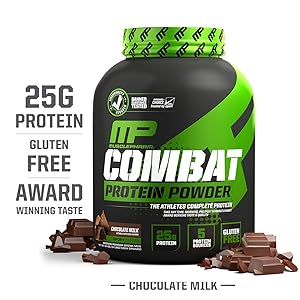
The latest product from market leader MusclePharm, the Combat Protein Powder works exactly as advertised.
It has a high protein content- 25 grams, which is actually a combination of whey concentrate and isolate. But depending on the flavor, the amount of protein content changes slightly. In total, you get 130 calories per 33-gram scoop.
This whey protein is available in 5 flavors: strawberry, cappuccino, cookies n’ cream, vanilla and chocolate. All flavors taste great, and they are inclined towards the sweet side.
And, the powder mixes nicely without forming any clumps. To make your gluten-free protein drinks, add a scoop of the product to between 8 and 10 ounces of your preferred beverage.
- Does not use any artificial dyes or colors
- Provides 25 grams of protein per serving
- Low fat and carb content
- Nice taste and mixing
- Uses a few artificial flavors
- Has lactose; hence unsuitable for those allergic to this compound
6. KOS Organic Plant-Based Protein Powder

For those who prefer vegan protein powders, the KOS Organic makes a strong contender.
It’s made from wholesome, plant-based protein. And although the manufacturer doesn’t necessarily specify the types of proteins, the blend of pea protein, chia seeds, pumpkin seeds, flax seeds and quinoa makes a complete amino acid profile.
KOS protein powder is highly nutritious. It contains vitamins A, C, D, and a few B-vitamins. But the key highlight is that it provides 40% of your recommended daily iron intake. This is very beneficial for individuals who have a hard time meeting this requirement on a plant-based diet.
This supplement powder mixes fairly well. This is a huge bonus considering most vegan protein powders form unpleasant clumps. With KOS, it blends easily whether you’re using a blender or simply stirring it into fruit juice.
The only drawback of this protein powder is its high price tag. A 30-serving canister of this superfood sets you back quite a bit.
- It’s free of soy
- Low sugar content
- Crafted with high-quality plant-based ingredients
- Versatile; works well in juice, water, smoothies and even baked goods
- Has a delicious taste
- Expensive
7. Quest Nutrition Chocolate Milkshake Protein Powder

Looking for a protein powder that will help you increase muscle mass? The Quest Nutrition Milkshake Protein Powder is a solid choice.
It provides a high dose of protein while keeping the fat content low. Of the 100 calories that you get per serving, none of these are sourced from fat. This makes it a great option for individuals who are also trying to reduce their fat intake.
Quest Nutrition Milkshake is made up of a protein blend. This consists of whey protein isolate, micellar casein and milk protein isolate. Like whey isolate, micellar casein is another dairy-based protein, and it promotes muscle growth and repair.
Other ingredients used in this formula are: natural flavors, xanthan gum, cellulose gum, sunflower lecithin, salt, sucralose and stevia.
- Lactose-free
- Forms a thick mixture, which is perfect for making protein desserts like pudding
- The low-carb, low-fat profile makes it fit for baking applications
- Though it does not have any artificial flavors, it has an artificial sweetener, Splenda
8. Muscle Milk Genuine Protein Powder

While they are mostly known for their variety of shakes, Muscle Milk also makes gluten-free protein supplements like their Genuine Protein Powder.
One scoop of this product contains 150 calories, 16 grams of protein, 6 grams of fat and 9 grams of carbs. Compared to other supplements, this one has a higher carb content and lower protein content.
According to the manufacturer, they formulated this protein powder in this manner to provide a good balance of proteins, carbs and fats. To some extent, they did achieve this goal. But if you’re looking for a proteinous supplement, I suggest you choose from the other options in our review.
Despite its low protein proportion, Muscle Milk Genuine has a generous amount of micronutrients. It’s reinforced with vitamins A, C, D, E, B12, B6, zinc, iron, copper, magnesium, among others.
- High vitamin and mineral content
- Comes in an array of flavors
- Made of high-quality proteins
- Can cause weight gain
- Contains artificial sweeteners
9. Isopure Zero Carb Protein Powder

In an era where people are beginning to be more conscious about their health, a zero-carb protein powder like Isopure is a very attractive choice.
Instead of carbs, this supplement promises a dozen micronutrients. It has at least 25 different minerals and vitamins. Examples of minerals in this product are:
- Potassium chloride – it helps to stabilize blood glucose levels and increase potassium levels
- Sodium chloride – regulates blood pressure
- Vitamin E – contains anti-inflammatory and antioxidant properties
- Vitamin B – enhances energy levels and supports growth and development
- Vitamin K – it’s good for circulatory, cognitive and bone health
As for protein content, Isopure delivers 25 grams of protein, which consists of whey protein isolate. This kind of protein has been processed thoroughly to get rid of more fat, carbs, lactose and calories.
With just 0.5 grams of fat and 10 milligrams of cholesterol, it’s evident that the protein has a healthy nutrient profile.
- Perfect for individuals with sensitivities as it does not have any gluten or lactose
- Mixes well
- Low calorie and zero carb content
- Includes a ton of vitamins and minerals
- Some flavors have a slightly synthetic taste
10. Orgain Organic Plant-Based Protein Powder
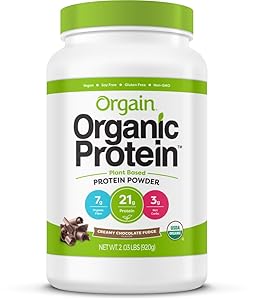
Finding a genuine plant-based protein powder can be difficult, which is why it helps to have a second option like the Orgain Organic. This is made of only natural ingredients so you’re guaranteed of getting value for your money.
The first ingredient listed on this supplement is a protein blend consisting of pea, chia seed, hemp and brown rice. The manufacturer has also incorporated a unique Creamer Base derived from acacia gum, rice dextrins, rosemary extract, rice bran extract and inulin.
Other ingredients are mainly sweeteners, stabilizers and thickeners. With regards to nutrients, Orgain Organic provides 21 grams protein, 3.5 grams of fat and 15 grams carbs.
An important point to note is that some of the carbohydrates are derived from fiber and sugar, which are sometimes not considered as true carbs. This is because they’re not absorbed in the same way that regular carbs are. But even then, people with sensitivities should opt for other lower-carb protein powders.
- It’s not too sweet
- Mixes relatively well even though it doesn’t have lecithin
- A good amount of proteins
- Low fat and calorie content
- Not suitable for people with sensitive stomachs
Why should you use a gluten-free protein powder?
Gluten is a kind of protein that occurs naturally in grains such as barley, wheat, and rye.
While it does have some benefits, some people experience severe reactions if they take gluten-filled products. In particular, individuals diagnosed with glucose intolerance and celiac disease should steer clear of this product.
Whether you avoid gluten because of medical reasons or voluntarily, you will find numerous types of protein powders. These can be classified into two:
- Whey-based gluten-free
- Plant-based dairy gluten-free
Whey
This is a by-product obtained from cheese manufacturing. The greatest benefit of gluten-free whey protein is that it contains all nine essential amino acids and it gets digested quickly. This means it’s absorbed into the bloodstream faster; hence reaches the muscles quickly.
There are three main types of whey protein:
Whey protein concentrate
As its name suggests, this is a protein that retains the majority of its nutrients but still has small amounts of lactose and fat.
Whey protein isolate
This one has a much higher percentage of protein since most of the fat, carbs, and fat-soluble vitamins have been removed.
Whey protein hydrolysate
This is described as the pre-digested type of protein as it breaks down peptides to allow for quicker absorption.
Plant-Based Protein
Vegan protein is sourced from products such as soy, pea, hemp, and more recently, a blend of more than one protein.
Since these protein powders are formulated exclusively from plant-based ingredients, they’re suitable for vegans. Often, they’re regarded as being hypoallergenic because they don’t contain any lactose or gluten.
While these protein powders are easily digestible, they have one major drawback: they lack some amino acids. For instance, pea protein does not have cysteine while both brown rice and hemp lack lysine.
So if you decide to go for plant protein powders, it’s wise to use a combination of them to ensure you’re getting a complete amino acid profile.
How do I choose the best gluten-free protein powder?
How do you determine which protein powder meets your health goals?
Match it to your needs
Start by establishing the specific purpose for buying the protein powder. Are you hoping to boost your muscle gain? Or would you like to shed a few pounds? Here are a couple of guidelines:
Muscle gain
If your goal is to build muscle, then go for protein powders with high biological value. This is a metric that determines how efficiently your body absorbs and utilizes protein. Whey isolates often have a higher biological value than other types.
Weight loss
Protein powders can also help you accomplish your weight loss goals. However, you’ll need to be very deliberate about your choices, and pick only those that don’t have added sugars or starch-sourced sweeteners. Also, avoid those with branched-chain amino acids as they trigger weight gain.
Vegetarian or vegan
If you follow either one of these diets, then don’t fall into the temptation of buying dairy-based protein powders. Simply put; you shouldn’t choose any protein powder containing whey or milk protein.
Diabetes
For people suffering from this condition, you’ll want to avoid any protein powder with added sugar. It’s also advisable to choose one that’s low in carbs.
Kidney disease
If you’re suffering from kidney disease, chances are that you can’t tolerate excess amounts of protein. Thus, you should look for a product with low protein content, preferably between 10 and 15 grams.
Gastrointestinal problems
If you experience sensitivities, then choose protein powders that neither use artificial sweeteners, artificial flavors nor lactose.
Timing
Apart from these health concerns, you also have to consider what time of the day you’ll be taking your protein powder. Do you plan to consume it right before a workout? Or take it first thing in the morning?
The reason for this is that protein powders have different amino acids, which function differently in your body depending on when you consume them.
For example, if your plan is to take the protein as soon as you’re done with your workout, then your goal is to replenish nutrients in your muscle cells to kickstart the recovery process. For such, you want a protein that is absorbed and digested quickly- like a whey isolate.
On the other hand, if you’ll be taking it right before you retire to bed, then you need a slower-burning type such as casein protein powder. This way, you’ll have a constant supply of amino acids being released into your bloodstream throughout the night.
Takeaway
Gluten-free protein powder makes an excellent addition to smoothies, desserts, or even as part of your weight-loss diet. Mix your gluten-free protein powder in your choice of drink to serve as a snack, a meal substitute, or an energy booster. But before purchasing these supplements, consider your health goals and status as well as the time you intend to consume the protein powder.
Using a gluten-free protein powder should be done as part of a carefully controlled diet. The importance of a well-balanced diet is on par with exercise when it comes to getting fit and healthy. Making the right choice in supplements is vital. You won’t want to take a bulk-inducing gluten-free protein powder if your goal is to get lean. Before introducing a gluten-free protein powder into your diet, do your research and decide which one works best for your personal goals. Give it a try, and see if you like the results. When trying new supplements, remember that it can take a while before you find one that truly works for you.